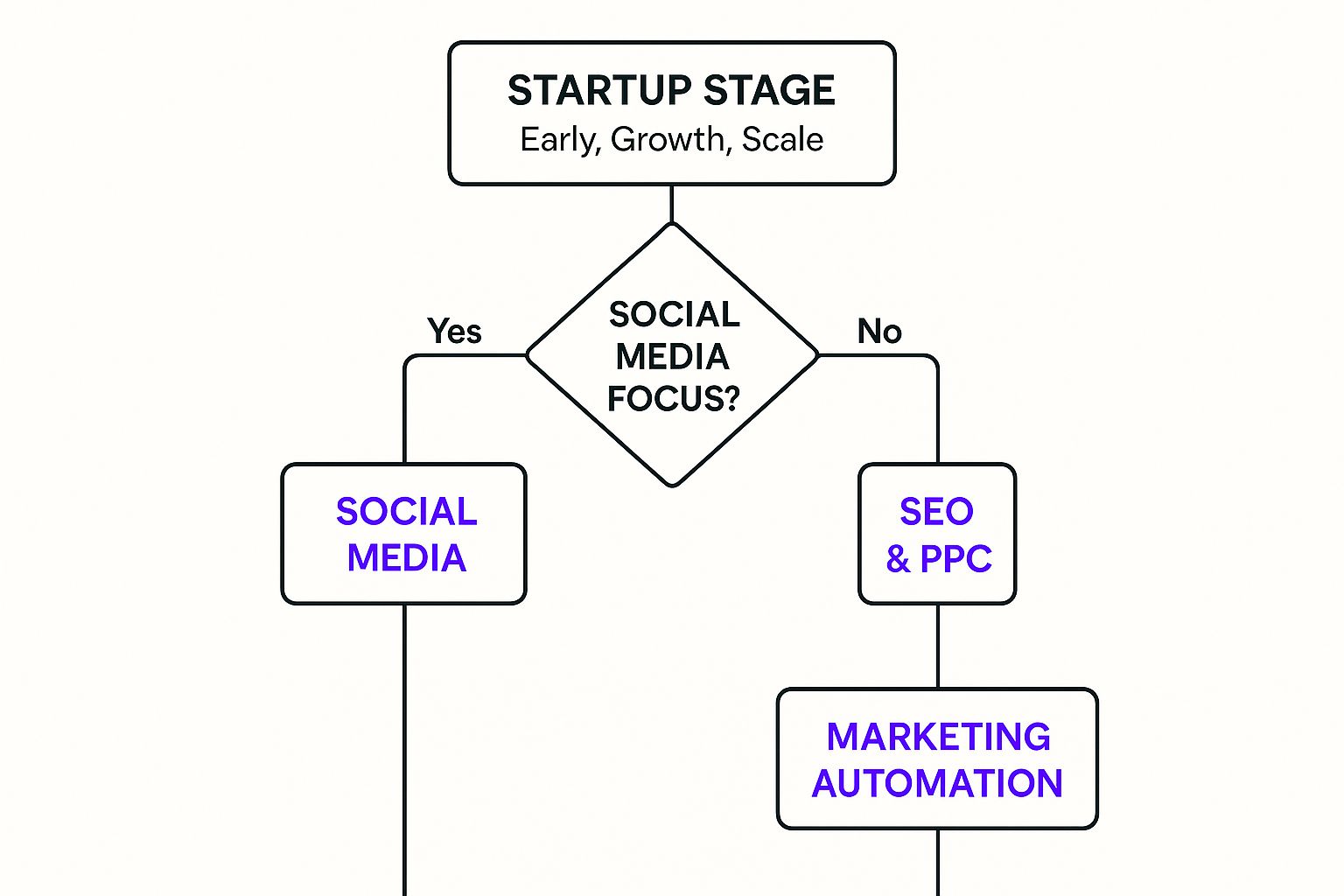Choosing a Digital Marketing Agency for Startups
Hiring a generic marketing agency for a startup is like trying to win a Grand Prix in your mom’s minivan. It’s safe, it’s comfortable, but you’re going to get lapped. A specialized digital marketing agency for startups is the Formula 1 car you actually need—a nimble growth partner built for speed, agility, and turning every drop of fuel into blistering momentum. They get the high-stakes pressure of scaling a new venture from zero.
Why Generic Marketing Is a Startup’s Worst Enemy

Picture a startup as a speedboat—agile, fast, and able to pivot on a dime to navigate choppy waters. Now, imagine a big, established corporation as a massive cruise ship. It’s powerful and steady, sure, but it turns with all the grace of a glacier and operates on a fixed, long-term course.
A generic marketing agency is built to service that cruise ship. They’re masters of maintaining momentum with established playbooks, giant brand campaigns, and predictable quarterly reports. Their entire process is designed for stability, not for the beautiful chaos where startups live and breathe.
The Speedboat vs. Cruise Ship Problem
For a startup, that "cruise ship" approach is a complete disaster. You don't have six months to wait for a brand study to conclude, and you definitely don't have the budget to absorb wasteful spending. You need a crew that thinks and acts like they're on a speedboat with you.
That’s the fundamental difference. A specialized agency is hardwired for the startup ecosystem, where speed, adaptability, and a ruthless focus on ROI are the only things that matter. They prioritize strategies that deliver instant learnings and scalable wins. While a big agency pitches a six-month brand awareness campaign, a startup-focused agency is launching targeted PPC ads in a week to test product-market fit and get the first leads in the door.
"Startups operate under a different set of rules. They don't need a marketing vendor; they need a growth partner who is obsessed with the same metrics the founders are—customer acquisition cost, conversion rates, and scalable revenue."
The Startup Pressure Cooker
The unique pressures on a startup demand a totally different kind of partnership. Frankly, generic agencies just don't get the urgency that defines an early-stage company.
- Limited Runway: Every single dollar has to either drive growth or deliver priceless data. There’s zero room for "fluffy" marketing that can’t be tied directly to results.
- Need for Agility: The market zigs, a competitor zags, or customer feedback demands a product pivot overnight. Your marketing partner needs to be able to rip up the playbook and build a new one in days, not quarters.
- Scaling with Funding: Your marketing has to work on a $5,000 monthly budget today, but also lay the groundwork for a $50,000 budget after your next round. It needs to be built to scale efficiently.
This world requires more than just a service provider; it requires a deep, almost intuitive understanding of the startup lifecycle. It’s about moving beyond generic strategies and digging into proven approaches like Account-Based Marketing tactics that prioritize quality over sheer volume. Finding an agency that speaks this language isn't just a nice-to-have—it's essential for your survival.
Decoding the Startup Marketing Playbook

Generic marketing agencies have a standard menu of services. But a true digital marketing agency for startups doesn't just offer services; they reframe them as tools for one specific mission: rapid, scalable growth. They don't just "do SEO"—they build a strategic moat. It's not just "running ads"—it's a high-speed lab for testing your entire business model.
Let's break down this specialized playbook. Understanding how these core services are bent to fit the startup lifecycle is the key to seeing their real value. This isn't about buzzwords; it's about building a cohesive growth engine from scratch.
SEO: The Defensible Moat
For a startup, Search Engine Optimization (SEO) is way more than just climbing to the top of Google. It’s about building a long-term, defensible asset. Think of it as constructing a fortress.
Paid ads are like hiring mercenaries—effective for a moment, but expensive and temporary. Strong organic rankings, on the other hand, are the high stone walls that protect your market share and generate leads on autopilot, long after you stop paying for a campaign.
A startup-focused agency gets this. They obsess over keywords that capture people actively hunting for a solution to a problem your product solves. This creates a sustainable river of qualified traffic that actually gets more valuable over time, making you less dependent on pricey ad channels as you scale.
The real goal here is to own the conversation in your niche. By creating content that answers your audience's most burning questions, you cement your brand as a leader, not just another option. For anyone starting out, a solid beginners guide to digital marketing can be a game-changer for grasping these core strategies.
PPC: The Product-Market Fit Accelerator
Pay-Per-Click (PPC) advertising is a startup's secret weapon for speed and data. If SEO is the fortress, PPC is the elite recon team you send out to map the terrain and find the fastest path to your objective. A sharp agency uses platforms like Google Ads and LinkedIn Ads not just for leads, but as a real-time feedback machine.
This rapid-fire testing is priceless. You can pit different value propositions, price points, and target audiences against each other in days, not months. The data you get back tells you exactly what messaging clicks with your ideal customer, feeding critical insights back into your product development and overall strategy.
A well-run PPC campaign for a startup isn't measured by clicks alone. It's measured by how fast it validates or kills your core business assumptions, saving you an insane amount of time and money.
This mindset transforms your ad spend from a simple expense into a strategic investment in market research. It’s about buying data to de-risk your growth path. You quickly learn which channels to pour gas on and which to abandon, ensuring every dollar is pushing you closer to that sweet, sweet product-market fit.
Content Marketing: The Authority Engine
For startups, content marketing isn't just about blogging. It's the engine you fire up to build trust and authority in a market where nobody knows your name. It’s your main tool for educating potential customers, showing off your expertise, and walking them from "who are you?" to becoming die-hard fans.
A startup-centric content strategy is all about creating high-value resources that solve real problems. It's not about volume; it's about impact. The playbook usually includes:
- Pillar Pages: Deep-dive guides on core industry topics that establish you as the go-to resource.
- Case Studies: Powerful stories showing how you helped customers just like them get real, tangible results.
- Webinars and Whitepapers: Gated assets that capture high-quality leads while delivering a ton of value.
This focus on becoming a trusted resource builds a loyal following and adds serious fuel to your SEO and social media efforts. It’s a core piece of the puzzle, and to see how all these parts fit together, you can dive into our guide on digital marketing for startups.
Finding the Right Agency to Partner With
Let’s be real. Choosing a digital marketing agency for your startup isn't like picking a new software subscription. It's more like choosing a co-founder for your growth team. This is a high-stakes decision that can either slingshot your trajectory or burn through your precious runway with almost nothing to show for it. You need a true partner, not just another vendor cashing a check.
This means your vetting process has to go way deeper than slick presentations and a gallery of impressive client logos. You need to get under the hood to see their process, their culture, and—most importantly—how they react when things inevitably go sideways. A great partnership is built on radical transparency, an obsession with data, and a shared hunger for hitting ambitious targets.
Asking Questions That Reveal True Character
Those initial calls with potential agencies are your best shot at cutting through the sales pitch. Generic questions get generic, canned answers. You need to ask questions that force them to reveal their actual problem-solving skills and prove they’ve been in the startup trenches before.
Here are a few powerful questions to add to your list:
- Tell me about a campaign that failed for a startup like ours. What were the initial assumptions, why did it flop, and what specific lessons did your team learn and apply to future work?
- How do you adapt your strategy when initial assumptions are flat-out wrong? Walk me through a real example where you had to pivot—hard and fast—based on new data.
- What does your ideal startup client look like? This is a sneaky way to find out if you fit their core competency or if you're an outlier they're just taking a chance on.
- How do you handle communication and reporting? Look for answers that scream proactive updates, clear dashboards, and a focus on metrics that actually matter (like CAC and conversion rates), not just fluffy vanity stats.
An agency that leans into these tough questions with specific, honest examples is showing you a culture of accountability. An agency that deflects or spits out a bunch of buzzwords is waving a massive red flag.
Look for Evidence of Startup DNA
Beyond their answers, you need to hunt for specific traits that define a true startup-focused agency. These characteristics are non-negotiable because they directly impact your bottom line.
An agency's culture is a leading indicator of its performance. A team that's scrappy, data-obsessed, and genuinely curious is built to win in the fast-paced startup environment.
You’re looking for a partner who is just as hungry for your success as you are. They should be challenging your assumptions, constantly bringing new ideas to the table, and acting as a genuine extension of your core team.
This infographic can help you map your current stage to the marketing services that will likely drive the most impact right out of the gate.

As you can see, marketing priorities shift dramatically. You start with foundational brand building and user acquisition in the early stages, then move to more complex optimization and automation as your startup begins to scale.
Startup Agency Evaluation Checklist
Picking the right agency can feel overwhelming. Use this checklist to systematically compare agencies on the criteria that matter most for startup growth. It keeps the process objective and helps you see who really measures up.
| Startup Experience (Portfolio) | |||
|---|---|---|---|
| Relevant Industry Expertise | |||
| Data-Driven Approach | |||
| Transparency & Communication Style | |||
| Cultural Fit & Scrappiness | |||
| Scalable Processes | |||
| Pricing & Contract Flexibility | |||
| Overall Gut Feeling |
Once you've filled this out for your top contenders, the right choice often becomes much clearer. Don't underestimate that "gut feeling" column—sometimes the data is close, but the cultural fit makes all the difference.
Vetting for Industry-Specific Expertise
While general marketing skills are table stakes, expertise within your specific vertical is a total game-changer. An agency that already understands the nuances of SaaS, FinTech, or eCommerce will get up to speed faster, make smarter strategic bets, and avoid costly rookie mistakes. They already speak your customer's language.
Think about it: marketing a B2B SaaS product is fundamentally different from marketing a direct-to-consumer brand. The sales cycles, customer motivations, and key performance indicators are worlds apart. An agency with a portfolio full of eCommerce clients might completely bomb when trying to generate qualified leads for a complex enterprise software product.
When vetting agencies, dig deep into their case studies and client history. Ask them to show you results for a company that looks like yours—similar size, industry, and target audience. This is the ultimate proof that they have a playbook that can actually work for you. Don’t settle for an agency that plans to learn your industry on your dime. Finding a true digital marketing agency for startups means finding one that has already navigated the exact path you're on.
Marketing Channels That Actually Move the Needle
For a startup, every single marketing dollar is an investment that has to punch above its weight. With a tight budget, you can't afford to throw spaghetti at the wall and see what sticks. The whole game is about focusing your firepower on the high-impact channels that actually move the needle, turning that shoestring budget into a growth engine.
A smart digital marketing agency for startups gets this pressure. They won’t push a "spray and pray" strategy. Instead, they’ll steer you toward the handful of channels that are proven winners for early-stage companies, helping you get the biggest bang for your buck in a ridiculously crowded digital world.
Mastering Mobile-First Strategies
Let's be real: your customers live on their phones. This isn't some groundbreaking trend; it's just how people operate now. A mobile-first strategy isn't a nice-to-have—it's the price of admission. This means everything you do, from your website to your ad creative, has to be designed for the small screen first.
A clunky mobile site or a janky-looking ad is an instant dealbreaker. People will bounce in seconds, and you’ll have just lit that precious ad spend on fire. An agency that knows startups will zero in on:
- Responsive Web Design: Making sure your website looks and works flawlessly on any screen size, no exceptions.
- Accelerated Mobile Pages (AMP): Creating lightning-fast landing pages so you don't lose people to slow load times.
- Mobile-Optimized Ads: Crafting ads that are crystal clear and compelling on a tiny screen.
This focus is non-negotiable, especially since mobile advertising is on track to make up 70% of total ad spend by 2028. If you don't master this channel, you're basically invisible to modern audiences.
Building Authority with Content Marketing
Content marketing is the startup's ultimate weapon for building trust and credibility from the ground up. When nobody knows who you are, great content is how you introduce yourself as an expert who solves real problems. It’s not about blogging into the void; it's about strategically creating assets that make your audience's lives easier.
A solid content strategy builds an audience that trusts you, making them way more likely to become customers later. In fact, research shows that a whopping 84% of B2B marketers use content just to build brand awareness. To even get started, you first need to learn how to create a digital marketing strategy that connects your content directly to your business goals.
"For a startup, great content is your best salesperson. It works 24/7, educating your audience, building trust, and qualifying leads before they ever speak to a human."
Of all the channels out there, social media marketing for small business is a goldmine for startups looking to build a brand and actually connect with people. Think of it as the main highway for getting your awesome content in front of the right eyeballs.
Using Interactive Content and AI Personalization
Let's face it, passive content just doesn't cut it anymore. People are drowning in information. Startups have to create experiences that pull users in and invite them to play. This is where interactive content shines.
- Quizzes and Calculators: These are brilliant because they give the user instant value while you capture valuable lead info.
- Webinars and Live Q&As: These formats let you interact directly with your audience, building a much stronger connection than a static blog post ever could.
- Interactive Demos: Why just tell people about your product when you can let them play with it? It’s a thousand times more powerful.
On top of that, Artificial Intelligence (AI) can put your personalization efforts on steroids. AI tools can analyze what people are doing on your site to serve up tailored content, personalized emails, and dynamic web pages. The secret is to use AI to make your marketing feel more human, not less. When you get it right, your message feels relevant and timely, making your audience feel seen without sounding like a robot. This is the kind of smart thinking that separates the startups that skyrocket from the ones that stall out.
Defining What Success Actually Looks Like

A partnership with a digital marketing agency for startups lives or dies on a single question: what does a “win” actually look like? If you don’t define the goalposts together, you’re just lighting money on fire and calling it marketing. It’s that simple.
The first step is to kill your obsession with vanity metrics. Social media likes, follower counts, and even raw website traffic feel good, but they’re empty calories. They don’t pay the bills or impress your investors. A great agency will yank the conversation away from these distractions and zero in on the numbers that signal a healthy, growing business.
Focusing on Metrics That Matter
To build a real growth engine, you and your agency need to become obsessed with the same handful of performance indicators. These are the numbers that tell the true story of your startup’s health and momentum.
Forget the fluff. You should be laser-focused on:
- Customer Acquisition Cost (CAC): How much does it really cost to land one new paying customer? The goal here isn't just to know the number, but to relentlessly drive it down.
- Lifetime Value (LTV): What’s the total revenue you can expect from a single customer over their entire relationship with you? This is the other side of the CAC coin.
- Lead-to-Customer Conversion Rate: What percentage of interested leads actually pull out their wallets and become customers? A small improvement here can have a massive impact on your bottom line.
A good agency knows your goal isn't just "more marketing," it's a healthy business. They’ll aim to get your LTV to at least a 3:1 ratio against your CAC. These aren’t just marketing stats; they are the fundamental vital signs of your company.
Balancing Long-Term and Short-Term Wins
Not all marketing channels are created equal. Different tools serve different purposes, and it’s critical to set the right expectations from day one. Let’s look at the classic odd couple: SEO and PPC.
Think of SEO as planting an orchard. It takes time, consistent effort, and a ton of patience. You won’t see a huge harvest in the first few months, but you're building a priceless asset that will eventually produce a sustainable, organic source of high-quality leads that compounds over time.
PPC, on the other hand, is like day trading. You get instant feedback. You know right away which messages, offers, and audiences are hitting the mark. This makes it an incredible tool for rapid learning, testing assumptions, and capturing demand that’s ready to buy right now.
A killer marketing strategy doesn't choose between long-term vision and short-term results. It blends them. You use the immediate data from PPC to sharpen your long-term SEO strategy, creating a powerful, self-reinforcing growth loop.
Creating a Realistic Roadmap
To keep everyone on the same page, your agency should help you build a clear 3, 6, and 12-month roadmap. This isn’t just a fancy document; it’s your shared source of truth. It outlines specific, measurable goals for each phase, preventing misaligned expectations and keeping everyone accountable.
A simple framework might look something like this:
- Months 1-3: The Foundation. This is all about setup, launching initial campaigns, and gathering as much data as possible. The primary goal is to establish baseline metrics and hunt for those crucial early wins.
- Months 4-6: Optimization & Scaling. Now you’re taking what you’ve learned and doubling down. Optimize the channels that are working, scale the budgets on your winners, and refine your messaging based on real performance data.
- Months 7-12: Expansion & Dominance. With a solid foundation, it’s time to expand into new channels, build out your content authority, and drive major improvements in your core business metrics like that all-important LTV/CAC ratio.
This shared roadmap is what elevates your relationship from a simple client-vendor transaction to a true strategic partnership—one that’s built to deliver measurable, meaningful results.
Navigating the Crowded Agency Market
Getting a handle on how the marketing agency world works gives your startup a massive advantage. The market is huge and ridiculously competitive, which forces the best agencies to specialize just to stay afloat. This isn't a bug; it's a feature. And it’s great for founders who know what they're looking for.
Globally, the digital marketing agency scene is a beast, pulling in an estimated $598.58 billion in 2024 alone. With that much money on the table, competition gets fierce. For agencies, the only way to stand out and deliver real results is to pick a lane and own it.
Why Specialization Is a Startup’s Best Friend
All this competition is actually fantastic news for you. It’s split the agency world into two very different camps.
On one side, you have the giant, established agencies built to serve massive enterprise clients. Think of them as cruise ships—powerful and steady, but slow to turn. Their entire operation, from pricing to processes, is designed for managing huge budgets for brands everyone already knows.
Then you have the specialists: the digital marketing agency for startups. These firms are purpose-built for speed. They get the pressure of a limited runway, the need to pivot based on data yesterday, and the obsession with metrics like Customer Acquisition Cost (CAC). Their whole business model is wired for the startup lifecycle—nimble, scrappy, and relentlessly focused on ROI.
Choosing a niche agency isn't just a preference—it's a critical decision that aligns your startup's needs with an agency's core business model. This alignment dramatically increases your chances of a successful and profitable partnership.
Matching Agency Model to Your Growth Needs
Once you understand this market dynamic, filtering out the wrong partners becomes way easier. If an agency's website is a highlight reel of Fortune 500 case studies, you can bet their systems and price tags are a poor fit for an early-stage company. They’re playing a different game with different rules.
But an agency that talks about Series A funding rounds, agile campaign sprints, and scalable lead generation? They're speaking your language. They know that landing your first hundred customers requires a completely different playbook than landing the next ten thousand. Our deep-dive into lead generation for startups breaks down these kinds of specialized tactics.
Spotting these differences helps you quickly sift through the noise and find agencies that aren't just vendors, but true growth partners structured to help you win.
We Get It—You Still Have Questions
Even when you've got a plan, hiring an agency feels like a massive leap. Let's cut right to the chase and tackle the questions every founder asks before they sign on the dotted line. No fluff, just straight answers so you can move forward with confidence.
How Much Is This Going to Cost Me?
Ah, the million-dollar question. Costs are all over the map, but most agencies that specialize in startups work on a monthly retainer. You can expect to see fees anywhere from $3,000 to $15,000+ a month, depending on how much work they're doing and what services are in the mix.
Honestly, the price tag itself isn't the most important part. What really matters is the value you're getting back. The proposal should spell out exactly what they're going to deliver and how it connects back to your growth targets. Some agencies will also quote one-off projects, like rebuilding your website or knocking out a foundational content strategy.
The real key? Find a partner whose pricing actually makes sense for your funding stage. A great agency should feel like an investment in growth, not just another line item on your P&L.
When Is the Right Time to Hire a Marketing Agency?
Timing is everything. The sweet spot is usually right after you've found some semblance of product-market fit. You know you're solving a real problem, you have a small crew of happy customers, but you're stuck and need to scale beyond just you and the other founders grinding it out.
- Hiring too early is a classic founder mistake. You'll just torch cash trying to market a product the world isn't ready for yet.
- Hiring too late means you're leaving money on the table and giving your competitors a head start.
Think of it like this: an agency is the gasoline. You need to have a spark first before you pour it on the fire.
Should I Hire an Agency or Just Build a Team In-House?
This is the eternal startup debate, isn't it? On one hand, an agency gives you instant access to a whole squad of specialists—an SEO guru, a paid ads whiz, a content strategist—without the soul-crushing overhead of salaries, benefits, and recruiting fees. It's built for speed.
On the other hand, an in-house team lives and breathes your brand and sticks around for the long haul, but building one from scratch is painfully slow and expensive.
Here’s what we see work best: a hybrid approach. Many startups partner with an agency to light the initial fire, figure out which channels actually work, and write the playbook. Then, as the company grows, they gradually bring in-house talent to take over the proven strategies.
Ready to stop guessing and start growing? Rebus is the strategic partner built to turn your startup's potential into measurable market traction. Schedule a consultation with us today!

